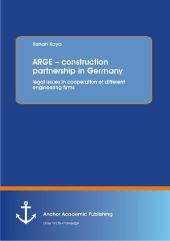 Neuerscheinungen 2012Stand: 2020-01-07 |
Schnellsuche
ISBN/Stichwort/Autor
|
Herderstraße 10
10625 Berlin
Tel.: 030 315 714 16
Fax 030 315 714 14
info@buchspektrum.de |

Kenan Kaya
ARGE construction partnership in Germany: legal issues in cooperation of different engineering firms
1., Aufl. 2012. 92 S. 10 Abb. 220 mm
Verlag/Jahr: ANCHOR ACADEMIC PUBLISHING 2012
ISBN: 3-9548902-6-7 (3954890267)
Neue ISBN: 978-3-9548902-6-2 (9783954890262)
Preis und Lieferzeit: Bitte klicken
This survey investigates and evaluates the legal framework which an engineer faces when stepping into an ARGE partnership with other planning offices. ARGE, in the German construction industry an established form of partnership, becomes more and more important in acquiring and accomplishing construction projects.
The ARGE underlies the regulations of the German Partnership under Civil Law; consequently, the ARGE partners are jointly and individually liable for the contract. Thus the principal of the overall project enjoys fundamental advantages: He reduces his risk should it come to an insolvency of an ARGE partner, he increases competition, and he gets services out of one hand. Engineering firms who want to participate in these projects have to handle their capacities and risks. Presently, many engineering firms are not interested in participating in ARGE partnerships as they see no reason for a voluntary sharing of liability and want to be responsible and liable only for services they performed. Therefore, engineering firms are interested in an ARGE agreement which divides the responsibilities and liabilities in consideration of the rendered services. In external discussions with principals, ARGE partner could not change the joint and individual liability. Principals will not deal with the limitation of ARGE partners liabilities. However, other regulations could be defined in internal arrangements.
Besides the law-related aspects, it is advisable to redefine other regulations in the ARGE agreement. Partners, for example, should define a fulfillment obligation. In case of insolvency of one partner, the other partners still have to fulfill the contract. If there are services which they cannot carry out by themselves, they have to involve other partners.
Dipl-Ing. (FH) Kenan Kaya, MBA, was born in 1980 in Bietigheim-Bissingen. He finished his studies of Elektrotechnik at the Fachhochschule Esslingen in 2006 and completed his Master of Business Administration at the Fachhochschule für Ökonomie und Management in 2012. Before and during his studies, the author made valuable experiences in the construction industry. Due to his work in various engineering offices, he has faced and dealt with several problematic issues which motivated him to write this book.


